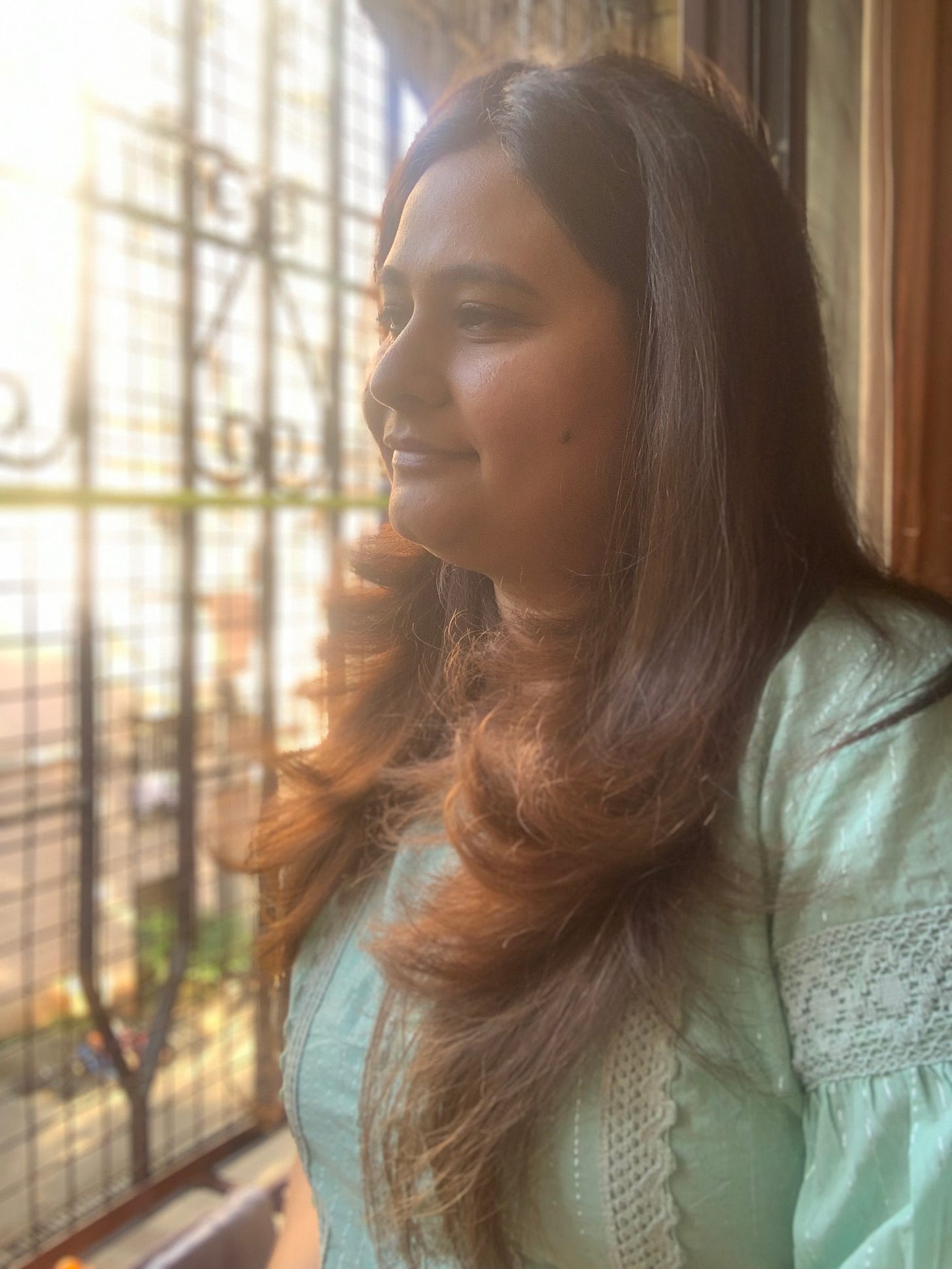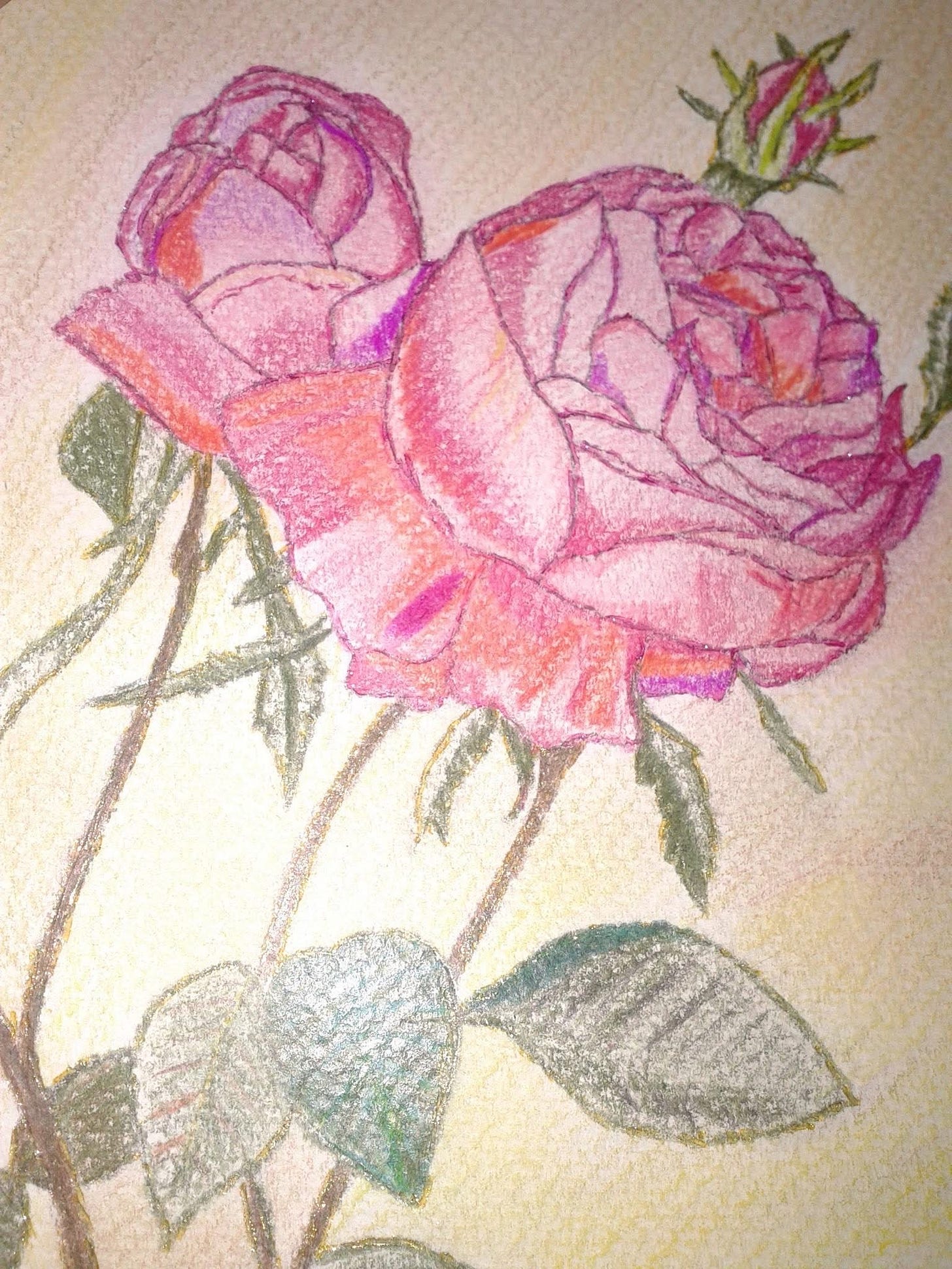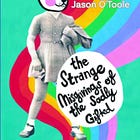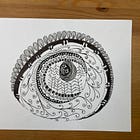“I think a poem is never truly finished. It only briefly completes in the poet’s throat,” with poet Priyanka Jaiprakash.
an interview
I am so pleased to share with you an insightful interview with poet Priyanka Jaiprakash. Her works are so tender and intimate; they leave me all up in my feels and quite speechless.
Priyanka Jaiprakash is a writer from India whose poetry is shaped by love, longing, memory, and absence. Her work moves between clarity and mystery, like breath between silence and speech. For her, poetry is refuge as much as release—an opening into the heart in a world too often led by the head. She dreams of gathering these poems into a book someday.
What compels you to write?
I began writing mostly in my late teens. I was always a very sensitive and empathetic child drawn to art — drawing, painting, language, films, and to emotional scenes or dialogues. I also had a very vivid imagination, which I think laid a natural foundation for writing.
As I grew older, nature began to draw me in. I remember one morning in college, I saw a tree and underneath it was this carpet of little yellow flowers, so breathtaking that I wrote a couplet about it. I shared it with a family friend who was like a friend and guide to me. She praised it, and that encouragement stayed. Around that time, I also kept a diary, filling it with moments that moved me deeply — my longings, my unrests, and things I could not say aloud. Writing became a way to release what I could not carry, and to immerse myself in what I wanted more of. As an introvert, I rarely shared my inner life with others; I either spoke to God or poured it onto paper.
With time, my writing began leaning towards the theme of love. I was fascinated by its expressions, both luminous and dark. I developed a profound appreciation for poetry, and especially shayari — poetic couplets in Urdu — and found inspiration there.
Later still, my writing stopped being just about my own mind. If you are an empathetic person, your inner world becomes a blend of your own experiences and the borrowed fragments of others. I began to write poems drawn from what I witnessed in people close to me, or even those afar whose lives and experiences touched me briefly, but deeply. You write in a “second-hand, first person,” inhabiting others without erasing them. Empathy lets me borrow the first person without stealing it; I call that a second-hand I.
I believe we are all inherently connected — that’s what makes compassion and empathy possible. Yet from that same web of connection, each poet gathers a different thread. That’s what makes poetry both shared and singular — unmistakably the poet’s own.
What do you think are some essential ingredients of a good poem?
I think a good poem has many possible ingredients, and each person relates to them differently. For me, I value depth of feeling, details, vivid imagery, clarity, and subtle nuance. I love when a poem makes me see the familiar in a new light, or captures something delicate that might otherwise escape notice. I love poems that press on the hidden pulse of experience, so that it resonates deeply.
I also appreciate poems with musicality — not necessarily rhyme, but rhythm and sound, the way the language moves in the mouth and ear. These are qualities I try to bring into my own poems.
If you had to describe your poems to someone who’s never read them, what would you say?
My poems often lean towards psychological depth, but with a minimalist, restrained voice. I draw often from nature and the ordinary objects of daily life to weave my verses.
Themes of longing, memory, absence, grief, silence, and surrender recur in my work — sometimes without my noticing, and sometimes with deliberate invitation. I am drawn also to love — not only the romantic kind, but devotion, beauty, and a love that leans towards the spiritual, towards something higher. In my poems, love isn’t the subject so much as the lens — the way the world comes into focus.
Many of my poems take on a meditative quality — perhaps because they rise from a place of silence. Sometimes I feel I don’t write on silence, or the unspoken, but with it.
I also like to experiment — I tune each poem differently, shifting the dial between clarity and mystery, a surreal take and plain feeling — until the resonance clicks.
Which writers have influenced you, or mean a lot to you?
Almost everything I read influences me in some way. Recently, I’ve been reading Ocean Vuong. But I feel a special kinship with selected works of Mahmoud Darwish, Kahlil Gibran, Rumi, Sylvia Plath, Emily Dickinson, Mary Oliver, Anaïs Nin, Albert Camus, among others.
In Urdu shayari, I admire Ghalib, Faiz, and Faraz.
What are some of your favorite lines?
“All roads lead to you, even those I took to forget you.” – Mahmoud Darwish
“I took a deep breath and listened to the old brag of my heart. I am, I am, I am.” – Sylvia Plath
“Love knows not its own depth until the hour of separation.” – Kahlil Gibran
“Lovers don’t finally meet somewhere. They are in each other all along.” – Rumi
“I wish you a kinder sea.” – Emily Dickinson
“In the depth of winter, I finally learned that within me there lay an invincible summer.” – Albert Camus
“I have built, deep in my heart, a chapel filled with you.” – Marcel Proust
“Morning without you is a dwindled dawn.” – Emily Dickinson
“Someone I loved once gave me a box full of darkness. It took me years to understand that this too, was a gift.” – Mary Oliver
“We don’t see things as they are, we see them as we are.” – Anaïs Nin
“You are not a drop in the ocean. You are the entire ocean in a drop.” – Rumi
“The floor seemed wonderfully solid. It was comforting to know I had fallen and could fall no further.” – Sylvia Plath
“We write to taste life twice, in the moment and in retrospect.” – Anaïs Nin
How do your poems change you?
I think we often write to make sense of what we feel, to give voice to what remains unspoken. Writing helps me find clarity — and as that clarity deepens, I find myself subtly changed or reshaped.
How do you know when a poem is finished?
I don’t. I think a poem is never truly finished. It only briefly completes in the poet’s throat.
I often struggle to shape words into exactly what I mean to say. Sometimes it feels as though English doesn’t have enough shades of words to capture every nuance of the human heart. In Hindi and Urdu, for instance, there are many more subtle distinctions of love that don’t quite translate. In English, you have to lean instead on imagery, rhythm, and metaphor.
Often, while refining, I end up overemphasizing or underemphasizing certain feelings to make them more interesting or evocative. But there is always room for improvement.
Plus, with time and experience, I believe I could always rewrite the same poem with greater depth or layers.
Perhaps that is the true nature of art — it lives in its incompleteness, as Leonardo da Vinci once said: “Art is never finished, only abandoned.”
Do you think of writing as an act of solitude, or an act of communion?
Both. Among art forms, I feel music is the most transcendent — for it has the power to raise your vibrations instantly. Yet music leans on words for depth. Words woven in music can lead us to places within us we didn’t know existed.
What does writing give you that nothing else does?
Writing gives me a way to live through the heart. My career is mostly head-driven, but poetry restores a sense of balance. If I had been more self-aware earlier, I might have chosen a path nearer to art. The act of creating — of shaping something from silence — brings me a strange sense of satisfaction.
Porous
by Priyanka Jaiprakash1
I’m porous— like a sky that forgets its edge. I dim my needs, stretch my limits like silk over sharp corners, until I snap— lose shape, unspool from myself, and vanish into the fog of what I’m not.
Drawn to fall
by Priyanka Jaiprakash2
I’m enchanted by your smile— each glance a feathered breeze that stirs the petals of my soul, and the softer you look at me, the more I fall, fall, fall, like ripe autumn leaves, into you.
The Inke of Goodbye
by Priyanka Jaiprakash3
She said to herself— the waiting ends, and the time has come to leave. Will the moment of meeting also be the moment of parting? I’ve spent years that have passed in the blink of an eye, building bridges in this city that was never mine. I’ve scattered my soul in the spots we call our own, planting little lights of love on every path we roamed. I’ve laid down roots in these restless sands— as the wind turns, it lifts parts of me like loose strands. I’ve inked my skin with a love of a kind— like a piece of music mastered and memorised across many lives. Now, I break free from this hard-soft shell— an identity stirred into my soul, woven into my skin. I leave behind a part of me out of my own will!
invitation to guest post
I love honoring you honoring your practices of all kinds, from the unhurried practice of baking sourdough bread to the dedicated practice of relearning to read after cognitive disability. Won’t you share them with me? unraveling, unmoored will soon be hearing from book artist, researcher, and educator Isabella Myers. Guidelines can be found on the About Page. Please message or email with questions.
unraveling, unmoored thrives on reader support; without you, we wouldn’t be here. We’d be somewhere else looking for you. We’d love to connect with more like-minded poets, artists, and practicing souls, and you can help us find them by talking us up in all of your digital and analog spaces and sharing this post with everyone you’ve ever met. With gratitude.
If this piece inspired you or otherwise spoke to you, consider upgrading to a yearly subscription or sending a one-time tip to unraveling, unmoored.
“Porous” is excerpted from a The Soul Shelf post.
“Drawn to fall” is excerpted from The Soul Letter #2.
“The Ink of Goodbye” was previously published at Delhi Poetry Slam.










Good interview! It is always fascinating to see why and how someone was drawn to write.
I feel this way about poems too. It's just abandoned not "finished." Not always though. Sometimes I feel I can do no more, and therefore I can assume it is complete.
Loved the poems, especially the fall one ❤️